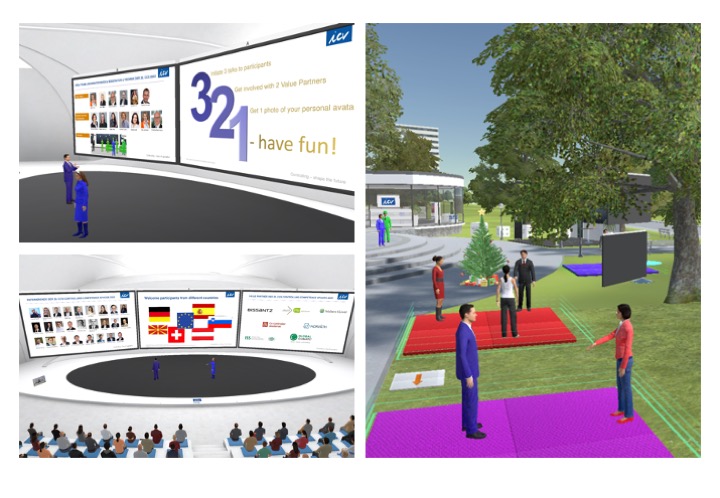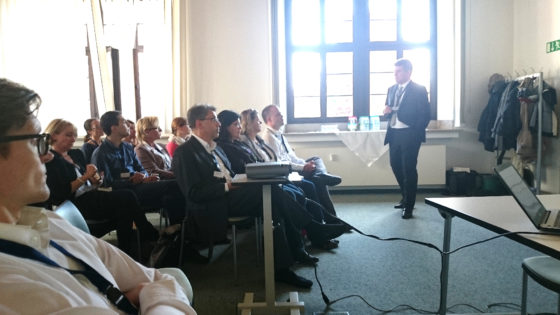Vier Keynotes, vier Sessions mit jeweils fünf parallel Vortragenden, ein Übungsslot in Extended Reality, dazu Speed Connect, die Verleihung des ICV Newcomer Awards und die Verkündung des CO2 Fußabdrucks der Veranstaltung – wenn ein derart prall gefülltes Programm, das erstmals auch ein durchgängig englischsprachiges Angebot gemacht hat, bereits zum dritten Mal über die virtuelle Bühne geht, dann ist klar: die Controlling Competence Spaces hat stattgefunden. Wie gewohnt gab es dort neue Erkenntnisse, schöne Begegnungen und vieles, das einen neuen Blick auf den Controlling-Alltag ermöglicht.
In den Keynotes nahm Laurent Burdin, Gründer von Space and Lemon Innovations, die Teilnehmenden im Trendradar der Weltwirtschaft mit in die Welt der Gewinner und Verlierer. Burdin hat es sich zur Aufgabe gemacht, aktuelle Themen und Entwicklungen aufzuspüren und zu bewerten, ob es sich nur um einen Hype oder doch um einen Trend handelt. Bemerkenswert ist für ihn der derzeit zu beobachtende „Break of Privilege“ und damit die Entwicklung hin zu alternativen Anbietern zu den scheinbar unerschütterlichen Global Playern, die bis dato mit ihren Produkten und Dienstleistungen eine nahezu monopolartige Position auf dem Markt haben. „Wir werden in den kommenden Jahren noch viele Brüche dieser Privilegien erleben“, so seine Einschätzung, bevor er den ControllerInnen unter anderem Tipps gab, was sie angesichts seiner Erkenntnisse und Vorhersagen schon heute für ihr Berufsbild und ihren Berufsalltag beachten sollten.
Christian Huck und Andrea Kämmler-Burrak, beide Horváth & Partner, haben ihre Erfahrung aus der Arbeit mit verschiedenen Unternehmen mit den Teilnehmenden geteilt und dabei aufgezeigt, wie stark die Nachhaltigkeit in der CFO-Agenda inzwischen eingepreist ist. Ihr Fazit: Es gibt noch viel zu tun. Unter anderem deshalb, weil jedes fünfte Unternehmen noch gar nicht damit begonnen habe, sich mit Nachhaltigkeitskonzepten auseinanderzusetzen. Ihr Appell: „Sehen Sie nicht immer nur die Risiken, Barrieren, Aufgaben und Hürden in diesem Zusammenhang. Betrachten Sie die neuen Möglichkeiten und schöpfen Sie sie aus!“ Andrea Kämmler-Burrak stellte darüber hinaus in ihrer Funktion als Mitglied des ICV Fachkreises Green Controlling for Responsible Business gemeinsam mit Prof. Dr. Mike Schulze, ebenfalls Fachkreis-Mitglied, erste Ergebnisse aus der ICV Green Controlling Studie 2022 vor. Eine Erkenntnis daraus lautet: “Die ganzheitliche Berücksichtigung von finanziellen und nicht-finanziellen Informationen im Risikomanagement sowie die Integration von Nachhaltigkeit in Daten-und Systemlandschaften spielen noch eine untergeordnete Rolle”. Ein klarer Auftrag an die ControllerInnen im Sinne des Mottos der CCS 2022 “Agil, digital, nachhaltig: Tu du’s!”. Alle Studienergebnisse werden im Detail zum Jahresende vorgestellt. Dann wird die Studie auch öffentlich verfügbar sein.
Einen Rundgang durch die Welt der Makro-Ökonomie in Zeiten der Krisen hat Prof. Dr. Georg Stadtmann mit den Teilnehmenden der CCS 2022 gemacht. Der Professor der Europa-Universität Viadrina verwies auf seine Einschätzung einer hohen Anspruchshaltung in Deutschland, das sich zu einem Land in der Vollkasko-Falle entwickele. Auch die Einführung des Euros ist für Stadtmann im Nachgang betrachtet keine gelungene, basiere sie doch auf der Maßgabe „One Size fits all“, die sich aber angesichts des heterogenen Euro-Raumes als falsch erwiesen habe.
In drei Sessionslots fokussierten die Vortragenden jeweils parallel die Schwerpunkte Digitale Transformation, Sustainable Finance, Chances & Risks, Agiles Controlling sowie Digitalisierung & Automatisierung. In einem weiteren Slot präsentierten die drei FinalistInnen des ICV Newcomer Awards 2022 ihre Arbeiten genauso wie der Gewinner und ein Finalist des ICV Controlling Excellence Awards 2022.
Neben der Verleihung des ICV Newcomer Awards 2022, den Ayse Kötemen für ihre Arbeit über die Integration von Predictive Analytics ins Controlling gewonnen hat (wir berichten gesondert), überraschte Altan Günsoy von Global Climate mit dem Ergebnis seiner Berechnung des CO2-Fußabdrucks der CCS 2022. Rund 1.700 kg CO2 bringt die Online-Veranstaltung auf die ökologische Waage. Zum Vergleich: Hätte die Controlling Competence nicht in den Spaces, sondern in Präsenz stattgefunden, wäre das Ergebnis mit rund 17.000 kg gleich zehnmal so hoch. Während die CCS im Online-Format lediglich in den Bereichen Server, Streaming und Teilnehmer-Emissionen zu Buche schlägt, fallen bei Präsenzveranstaltungen insbesondere An- und Abreisen, Hotelübernachtungen, Catering, Logistik und Druckerzeugnisse ins grüne Gewicht.
Die 21. CCS Controlling Competence Spaces findet am 9. November 2023 statt. Die Eventsite: www.icv-controlling.com/ccs
Four keynotes, four sessions, each with five parallel speakers, a practice slot in extended reality, plus Speed Connect, presenting of the ICV Newcomer Awards and the announcement of the event’s CO2 footprint – when such a bulging program, for the first time also also with a consistently English-language offer, takes place on the virtual stage for the third time, then one thing is clear: the Controlling Competence Spaces has taken place. As usual, there were new insights, nice encounters and a lot that enables a new view of everyday controlling.
In the keynotes, Laurent Burdin, founder of Space and Lemon Innovations, took the participants into the world of winners and losers in the trend radar of the global economy. Burdin has set himself the task of tracking down current topics and developments and evaluating whether it is just hype or a trend. What is remarkable for him is the “Break of Privilege” that is currently being observed and with it the development towards alternative providers to the apparently unshakable global players who have had an almost monopoly position on the market with their products and services to date. “We will see many breaches of these privileges in the coming years,” was his assessment, before he gave the controllers tips on what they should consider today for their job description and their everyday work in view of his findings and predictions.
Christian Huck and Andrea Kämmler-Burrak, both Horváth & Partner, shared with the participants their experiences from working with various companies and showed how strongly sustainability is now priced into the CFO agenda. Their conclusion: There is still a lot to do. Among other things, because every fifth company has not even started to deal with sustainability concepts. Their appeal: “Don’t always just see the risks, barriers, tasks and hurdles in this context. Look at the new possibilities and make the most of them!” Andrea Kämmler-Burrak, in her function as a member of the ICV Expert Work Group Green Controlling for Responsible Business, together with Prof. Dr. Mike Schulze, also a member of the Expert Work Group, presented the first results from the ICV Green Controlling Study 2022. One of the findings is: “The holistic consideration of financial and non-financial information in risk management and the integration of sustainability in data and system landscapes still play a subordinate role”. A clear mandate to the controllers in line with the motto of the CCS 2022 “Agile, digital, sustainable: To do’s!”. All study results will be presented in detail at the end of the year. The study will then also be publicly available.
Prof. Dr. Georg Stadtmann made a walk through the macroeconomy with the participants of the CCS 2022. The professor at the European University Viadrina referred to his assessment of the high standards in Germany, which is developing into a country in the fully comprehensive insurance trap. In hindsight, the introduction of the euro was also not a success for Stadtmann, as it was based on the “one size fits all” principle, which turned out to be wrong in view of the heterogeneous euro area.
In three session slots, the speakers each focused on the key areas of digital transformation, sustainable finance, opportunities & risks, agile controlling and digitization & automation. In another slot, the three finalists of the ICV Newcomer Awards 2022 presented their works, as did the winner and one finalist of the ICV Controlling Excellence Awards 2022.
In addition to the ICV Newcomer Award 2022, which Ayse Kötemen won for her theses on the integration of predictive analytics into controlling (we report separately), Altan Günsoy from Global Climate surprised with the result of his calculation of the CO2 footprint of the CCS 2022. The online event puts around 1,700 kg of CO2 on the ecological scale. For comparison: If the Controlling Competence had not taken place in the Spaces but in person, the result would have been ten times as high at around 17,000 kg. While the CCS in the online format only has an impact in the areas of server, streaming and participant emissions, in the case of face-to-face events, travel to and from the event, hotel accommodation, catering, logistics and printed materials are of particular importance.
The 21st CCS Controlling Competence Spaces takes place on November 9, 2023. The event site: www.icv-controlling.com/en/ccs



